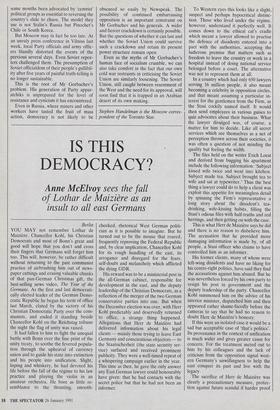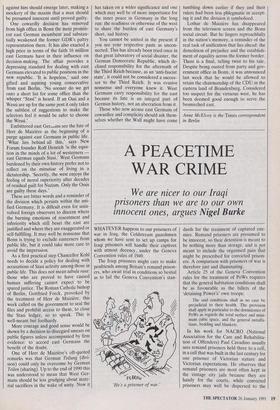IS THIS DEMOCRACY?
Anne McElvoy sees the fall
of Lothar de Maiziere as an insult to all east Germans
Berlin YOU MAY not remember Lothar de Maiziere. Chancellor Kohl, his Christian Democrats and most of Bonn's great and good will hope that you don't and cross their fingers that Germans will forget him too. This will, however, be rather difficult without returning to the past communist practice of airbrushing him out of news- paper cuttings and erasing valuable chunks of that pan-German Christmas gift, the best-selling news video, The Year of the Germans. As the first and last democrati- cally elected leader of the German Demo- cratic Republic he began his term of office last March, elated by the victory of his Christian Democratic Party over the com- munists, and ended it standing beside Chancellor Kohl on the Reichstag tribune the night the flag of unity was raised.
It had fallen to him to fight the unequal battle with Bonn over the fine print of the unity treaty, to soothe the fevered popula- tion through the upheaval of currency union and to guide his state into extinction and his people into unification. Slight, lisping and whiskery, he had devoted his life before the fall of the regime to his law practice and playing the violin in an amateur orchestra. He bore as little re- semblance to the thrusting, smooth-
cheeked, rhetorical West German politi- cian as it is possible to imagine. But he turned out to be the mouse that roared, frequently reproving the Federal Republic and, by clear implication, Chancellor Kohl for its rough handling of the east, its arrogance and disregard for the fears, self-doubt and melancholy which afflicted the dying GDR.
His reward was to be a ministerial post in the all-German cabinet, responsible for development in the east, and the deputy leadership of the Christian Democrats, as .a reflection of the merger of the two German conservative parties into one. But when the December election was over, with Herr Kohl predictably and deservedly returned to office, a strange thing happened. Allegations that Herr de Maiziere had delivered information about his legal clients — mainly those trying to leave East Germany and conscientious objectors — to the Staatsicherheit (the state security ser- vice) surfaced and received prominent publicity. They were a well-timed repeat of a whispering campaign earlier in the year. This time as then, he gave the only answer any EasWerman lawyer could honourably have given: that he had contacts with the secret police but that he had not been an informer. To Western eyes this looks like a slight, suspect and perhaps hypocritical distinc- tion. Those who lived under the regime, however, understand it perfectly well. It comes down to the ethical cat's cradle which meant a lawyer allowed to practise the defence of dissidents entered into a pact with the authorities, accepting the ludicrous premise that matters such as freedom to leave the country or work in a hospital instead of doing national service belonged before a court. The alternative was not to represent them at all.
In a country which had only 650 lawyers serving 16 million people, it also meant becoming a celebrity in opposition circles, and that meant assuming a particular in- terest for the gentlemen from the Firm, as the Stasi cockily named itself. It would then send employees in various guises to quiz advocates about their business. What the lawyer divulged was, of course, a matter for him to decide. Like all secret services which see themselves as a net of perception thrown across their societies, it was often a question of not minding the quality but feeling the width.
The files held on the writer Erich Loest and derived from bugging his apartment include the following information: 'Subject kissed wife twice and went into kitchen. Subject made tea. Subject brought tea to wife and sat at typewriter.' Thus the best thing a lawyer could do to help a client was exploit this appetite for meaningless detail by spinning the Firm's representative a long story about the dissident's tea- drinking, wife-kissing habits, filling the Stasi's odious files with half-truths and red herrings, and then getting on with the case.
This is what Herr de Maiziere says he did and there is no reason to disbelieve him. The accusation that he provided more damaging information is made by, of all people, a Stasi officer who claims to have controlled him as an informer.
His former clients, many of whom were left-wing dissidents and have no liking for his centre-right politics, have said they find the accusations against him absurd. But he was nevertheless forced by his own party to resign his post in government and the deputy leadership of the party. Chancellor Kohl summoned him on the advice of his interior minister, dispatched him and then appeared rather shame-facedly before the cameras to say that he had no reason to doubt Herr de Maiziere's honesty.
If this were an isolated case it would be a sad but acceptable case of 'that's politics'. Its provenance in the context of unification is much wider and gives greater cause for concern. For the treatment meted out to him by his colleagues and the lack of criticism from the opposition signal west- ern Germany's unwillingness to help the east conquer its past and live with the legacy.
The sacrifice of Herr de Maiziere was clearly a precautionary measure, protec- tion against future scandal if harder proof against him should emerge later, making a mockery of the maxim that a man should be presumed innocent until proved guilty.
One cowardly decision has removed from high office in Bonn the most promin- ent east German incumbent and substan- tially weakened the former GDR's paltry representation there. It has also exacted a high price in terms of the faith 16 million east Germans have in their influence on decision-making. The affair provides a depressing standard for dealing with east Germans elevated to public positions in the new republic. 'It is hopeless,' said one gifted and aspiring young conservative from east Berlin. 'No sooner do we get onto a short list for some office than the whisper "Stasi" is heard. If an Ossi and a Wessi are up for the same post it only takes the subtlest of suggestions to make the selectors feel it would be safer to choose the Wessi.'
Embittered east Ger...am see the fate of Herr de Maiziere as the beginning of a purge against east Germans in public life. `What lies behind all this,' says New Forum founder Rolf Henrich 'is the equa- tion in the minds of a lot of westerners - east German equals Stasi.' West Germans burdened by their own history prefer not to reflect on the minutiae of living in a dictatorship. 'Secretly, the west enjoys the feeling of moral superiority after decades of residual guilt for Nazism. Only the Ossis are guilty these days.' These are bitter words and a reminder of the division which persists within the uni- fied Germany. It is diffcult even for unin- volved foreign observers to discern where the burning emotions of resentment and inferiority which still beset the east are justified and where they are exaggerated or self-fulfilling. It may well be nonsense that Bonn is trying to exclude easterners from public life, but it could take more care to avoid the impression. As a first practical step Chancellor Kohl needs to decide a policy for dealing with accusations of Stasi activity among those in public life. This does not mean tabula rasa: those who are proved to have caused human suffering cannot expect to be spared justice. The Roman Catholic bishop of Berlin, Gottfried Forck, provoked by the treatment of Herr de Maiziere, this week called on the government to seal the files and prohibit access to them, to close the Stasi ledger, so to speak. This is well-meant but foolhardy. More courage and good sense would be shown by a decision to disregard smears on public figures unless accompanied by firm evidence: to accord east Germans the benefit of the doubt.
One of Herr de Maiziere's oft-quoted remarks was that German Teilung (divi- sion) could only be overcome by German Teller: (sharing). Up to the end of 1990 this was understood to mean that West Ger- mans should be less grudging about mate- rial sacrifices in the wake of unity. Now it has taken on a wider significance and one which may well be of more importance for the inner peace in Germany in the long run: the readiness or otherwise of the west to share the burden of east Germany's short, sad history.
You cannot be united in the present if you see your respective pasts as uncon- nected. This has already been tried once in that great laboratory of social disaster, the German Democratic Republic, which de- clined responsibility for the aftermath of the Third Reich because, as an 'anti-fascist state', it could not be considered a succes- sor to the Third Reich. It was evasive nonsense and everyone knew it. West Germans carry responsibility for the east because its fate is an integral part of German history, not an aberration from it.
Those who now accuse east Germans of cowardice and complicity should ask them- selves whether the Wall might have come tumbling down earlier if they and their rulers had been less phlegmatic in accept- ing it and the division it symbolised.
Lothar de Maiziere has disappeared from the television screen and the Bonn social circuit. But he lingers reproachfully in the nation's memory, a reminder of the real task of unification that lies ahead: the demolition of prejudice and the establish- ment of equality across the former border. There is a final, telling twist to his tale. Despite being ousted from party and gov- ernment office in Bonn, it was announced last week that he would be allowed to retain the chairmanship of the CDU in the eastern land of Brandenburg. Considered too suspect for the virtuous west, he has been deemed good enough to serve the besmirched east.
Anne McElvoy is the Times correspondent in Berlin



























































 Previous page
Previous page